 21 citations,
June 2011 in “Journal of child neurology”
21 citations,
June 2011 in “Journal of child neurology” Valproic acid and carbamazepine do not change biotin or biotinidase levels but may lower zinc levels, still within normal range.
[object Object]  129 citations,
January 2009 in “International Journal of Trichology”
129 citations,
January 2009 in “International Journal of Trichology” Trichoscopy can diagnose female hair loss with high accuracy by looking for specific patterns in hair and scalp appearance.
 June 2019 in “Brain Imaging and Behavior”
June 2019 in “Brain Imaging and Behavior” Hair loss can indicate brain aging and potential small vessel disease, but more research is needed to understand the clinical impact.
 19 citations,
April 2019 in “Journal of the European Academy of Dermatology and Venereology”
19 citations,
April 2019 in “Journal of the European Academy of Dermatology and Venereology” Acne lesions start with changes in hair follicles and increase in inflammation, suggesting a cycle that could affect treatment strategies.
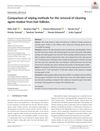 3 citations,
January 2019 in “Skin research and technology”
3 citations,
January 2019 in “Skin research and technology” All wiping methods are as effective as washing for removing cleaning agent from hair.
 2 citations,
October 2017 in “Revista Da Associacao Medica Brasileira”
2 citations,
October 2017 in “Revista Da Associacao Medica Brasileira” Removing p16INK4a from skin cells can lead to faster and more clumped growth, which might help with hair growth.
 27 citations,
March 2018 in “Fertility and Sterility”
27 citations,
March 2018 in “Fertility and Sterility” Women with PCOS who had antiandrogenic treatment before pregnancy had fewer complications than those without treatment.
[object Object]  40 citations,
November 2011 in “American Journal of Human Biology”
40 citations,
November 2011 in “American Journal of Human Biology” Stress from being transgender is linked to higher blood pressure at night and more inflammation, which may affect heart health.
 10 citations,
January 2012 in “International Journal of Trichology”
10 citations,
January 2012 in “International Journal of Trichology” The study found no link between anxiety, vitamin B12, folate, TSH, ferritin, zinc levels, and trichodynia in telogen alopecia patients.
2 citations,
April 2023 in “PubMed” Improving maternal diets can prevent severe health issues, including death, from goiter in goat kids.
 10 citations,
January 2016 in “Dermatology”
10 citations,
January 2016 in “Dermatology” Psoriasis lesions have fewer and smaller oil glands, which might affect the condition's development.
 62 citations,
January 2013 in “Skin Pharmacology and Physiology”
62 citations,
January 2013 in “Skin Pharmacology and Physiology” Low iron and vitamin D levels are linked to hair loss in women.
 25 citations,
August 2016 in “Journal of Cosmetic Dermatology”
25 citations,
August 2016 in “Journal of Cosmetic Dermatology” The marine complex supplement significantly improved hair growth in men with thinning hair without adverse effects.
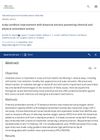 November 2024 in “International Journal of Cosmetic Science”
November 2024 in “International Journal of Cosmetic Science” Botanical extracts can improve scalp health by reducing oxidative stress.
 53 citations,
December 2015 in “JAMA Dermatology”
53 citations,
December 2015 in “JAMA Dermatology” Women with PCOS often have more body hair, acne, and skin darkening, and these signs are linked to metabolic issues like insulin resistance and high cholesterol.
 223 citations,
December 2010 in “The Journal of Sexual Medicine”
223 citations,
December 2010 in “The Journal of Sexual Medicine” Some patients taking finasteride or dutasteride may have ongoing sexual problems and depression even after stopping the medication.
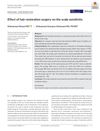 1 citations,
February 2020 in “Journal of Cosmetic Dermatology”
1 citations,
February 2020 in “Journal of Cosmetic Dermatology” Hair transplant surgery reduces scalp sensitivity by almost 40%, and smokers have less scalp sensitivity than non-smokers. The time since surgery doesn't significantly affect this.
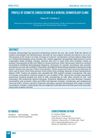 November 2019 in “Nepal Medical College journal”
November 2019 in “Nepal Medical College journal” Most people getting cosmetic dermatology are young, educated, working women with a good income, mainly concerned about wrinkles and often choosing chemical peeling.
 35 citations,
January 2014 in “Postepy Dermatologii I Alergologii”
35 citations,
January 2014 in “Postepy Dermatologii I Alergologii” DHT's role in hair loss is important, but measuring its level for diagnosis is questionable.
 July 2021 in “International Ophthalmology”
July 2021 in “International Ophthalmology” Female hair loss patients more likely to have dry eye and gland issues.
 November 2022 in “Cosmetics”
November 2022 in “Cosmetics” Red pigmented rice, like Sang-Yod rice, could help promote hair growth and prevent hair loss.
 4 citations,
August 2011 in “Aktuelle Dermatologie”
4 citations,
August 2011 in “Aktuelle Dermatologie” Topical melatonin is a safe treatment that may reduce hair loss in people with androgenetic alopecia.
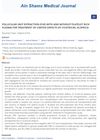 June 2022 in “Ain Shams medical journal”
June 2022 in “Ain Shams medical journal” Adding platelet rich plasma to hair transplant surgery leads to better results and more patient satisfaction.
 1 citations,
October 2013 in “Our Dermatology Online”
1 citations,
October 2013 in “Our Dermatology Online” 5α reductase type 2 enzyme mutation and oxidative stress may increase androgenetic alopecia risk in Egyptians.
 August 2013 in “Fertility and Sterility”
August 2013 in “Fertility and Sterility” PCOS may be influenced by factors in the blood, not just the ovaries.
18 citations,
July 2015 in “Journal of cosmetic dermatology” Straightening and coloring hair, especially with sodium hydroxide, greatly increases protein loss.
 14 citations,
January 2015 in “Clinical Nutrition Research”
14 citations,
January 2015 in “Clinical Nutrition Research” MK-R7 supplement with Cistanche Tubulosa and Laminaria Japonica extracts improved hair density and scalp health without adverse effects.
 37 citations,
January 2013 in “Postepy Dermatologii I Alergologii”
37 citations,
January 2013 in “Postepy Dermatologii I Alergologii” Isotretinoin effectively reduces acne but causes dry skin, higher skin pH, more redness, and hair loss.
 11 citations,
January 2014 in “International Journal of Trichology”
11 citations,
January 2014 in “International Journal of Trichology” Witch hazel-based hair products improved scalp irritation and were well-tolerated.
 176 citations,
August 1981 in “JAMA”
176 citations,
August 1981 in “JAMA” Toxic Shock Syndrome mainly affects menstruating women, can recur, and is linked to staph bacteria, with rapid treatment being crucial.



























